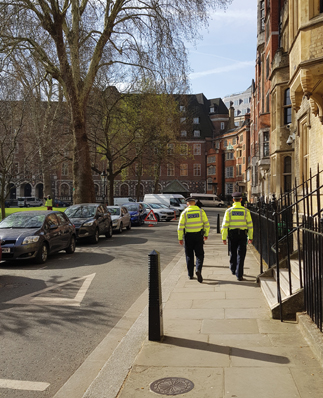The Home Office has published the Strategic Policing Requirement (SPR), detailing what’s required from police forces at the local and regional level in terms of ‘critical national threats’.
In a foreword to the 80-page document, Home Secretary Suella Braverman said that the SPR ‘plays a crucial role in allowing me to set the direction against the biggest threats to public safety and ensuring the police have the capabilities to deliver an appropriately robust, national response ensuring common sense policing prevails’. Ms Braverman made a connection between human trafficking into the UK (‘via small boats’) and the exploitation of the trafficked victims in ‘county lines drug supply lines – there are an estimated 600 lines in operation across the country in any given month’. While she made no mention of fraud, she did write that ‘policing continues to prevent dangerous and highly disruptive tactics used by organised protesters that wreak havoc to the lives of the law-abiding majority and draw police officers away from their local communities’.
The threats are seven-fold: terrorism, serious and organised crime, child sexual abuse, public disorder, violence against Women and Girls (VAWG), civil emergencies and a ‘national cyber event’, defined as a cyber attack against national infrastructure: chemicals, civil nuclear communications, defence, emergency services, energy, finance, food, government, health, space, transport and water.
As for fraud (the number one volume crime) and drugs not being mentioned in the seven, the document does state that ‘some stakeholders cited drugs trafficking, specifically the county lines model, and fraud as threats that cross [police] force boundaries that need to be addressed by policing. This iteration of the SPR includes the capabilities within the SOC [serious and organised crime] threat response, required to tackle the harm to communities and individuals caused by drugs and fraud’.
As for public disorder (rioting), the document included in the definition ‘large-scale organised protest at risk of hijack by those intent on causing public disorder’ while allowing ‘lawful protest’, ‘where such protests do not cause serious disruption to the lives of others’.
On terrorism, the document stated that police forces should have ‘relevant Protect capabilities’ – ‘Security Co-ordinators (SecCOs) who are trained to provide advice on all aspects of operation security for any event’; Designing Out Crime Officers (DOCOs) ‘who provide advice, guidance and assessments to local authorities and organisations on measures to reduce crime’ and who promote general crime reduction; and Project Servator officers, where trained and deployed, ‘who are tasked to conduct highly-visible and unpredictable deployments’.
Comment
The City of London Police (CoLP) is the force with national responsibility for fraud, or ‘economic crime’. CoLP Assistant Commissioner Pete O’Doherty said: “The scale of and threat from fraud is constantly evolving and the City of London Police, as the national lead force for fraud, has long advocated that it be a national priority within the Strategic Policing Requirement. We welcome that this is now a requirement, meaning police forces across the country will now include fraud as a priority when they set their own individual policing plans.
“Fraud is a unique and challenging crime which accounts for more than 40 per cent of all crime in England and Wales, and its scale and gravity has a huge impact on both individual victims and businesses. Effectively tackling fraud requires a whole-system approach and the City of London Police is committed to working with partners across government and the public and private sectors to achieve this.
“Policing is doing more and more to protect victims, prevent fraud and disrupt offenders. As the national lead force, we work with police forces across the UK, other law enforcement agencies and industry partners to reduce the harm of fraud for victims and increase criminal justice outcomes. We are also redesigning the Action Fraud reporting system to make it easier to make reports of fraud and create greater opportunities to identify and apprehend criminals.”
Three senior police officers who are National Police Chiefs’ Council (NPCC) leads on VAWG have written on the SPR.
Photo by Mark Rowe: Met Police on patrol, Dean’s Yard, Westminster.










